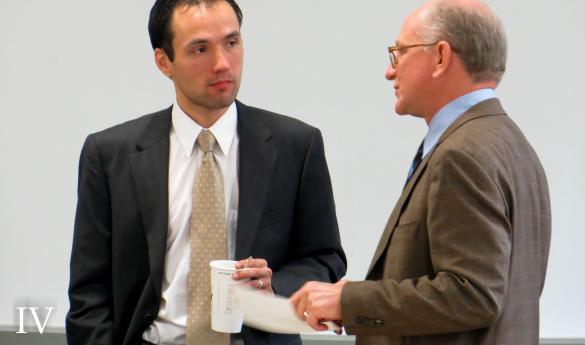Libertarian candidate for governor visits Mason
The Virginia Governor’s race is heating up between Democrat Terry McAuliffe and Republican Ken Cuccinelli. In order to build awareness about the other options in the election, third party candidate Robert Sarvis visited Mason, where he visited the Honors 131 class of Mason’s Pulitzer Prize-winning Professor Steven Pearlstein and answered questions from students and guests.
Sarvis, who is representing the Libertarian Party in the Nov. 5 gubernatorial election, spoke about some of the difficulties of running as a third party candidate.
“We don’t have a list of all the media, all the festivals,” Sarvis said. “Republicans and Democrats have been doing this for a long time. The Libertarian Party needs to work on developing these things and having a central database. Libertarians have a lot of passion; it’s important to make sure that’s used in a positive manner.”
Many of the students inquired about Sarvis’ plan for Virginia’s economy, asking how he would shrink the federal budget. As governor, Sarvis said there would not be much he could do directly at a national level, but it would help “having someone capable of arguing for a rational return to state control and having a good economic policy in Virginia.”
Part of that economic policy might be difficult for some Virginians to stomach. Sarvis said Virginia would have to reject some federal funding,
“We’re one of the few countries with a drinking age set so high,” Sarvis said. “I’m not arguing for changing the drinking age, but not [changing laws] just because the federal government is waving money at you.”
Sarvis also addressed one issue that has been particularly divisive in Northern Virginia: the bi-county parkway between Prince William and Loudoun counties.
“It seems like the Parkway is something the people don’t want,” he said. “Why is Richmond deciding this for Northern Virginia? It seems like Sean Connaughton trying to put away money into the local office to build his credentials. It’s a politicization of local issues.”
The last question, asked by one of the guests, dealt with gun control and the legality of citizens to carry firearms without a permit.
“People can carry a handgun without having to prove to the state that you are capable,” Sarvis said.
This comment prompted a response from Pearlstein, who asked if a citizen would then be allowed to carry a Bazooka or a machine gun.
“To carry a machine gun? No,” Sarvis said. “I mean weapons that are commonly used for self-defense. There’s been a two decade high for gun violence. There’s no substantial effect on gun violence. Why would we have laws that burden law upholding citizens? It’s a complicated issue that’s not very well understood.”
Even with increased awareness, Sarvis acknowledged that his election isn’t likely. Still, he says there’s merit to a strong third party.
“Our system creates an equilibrium between two parties,” Sarvis said. “Our job is to keep the other two parties honest.”

